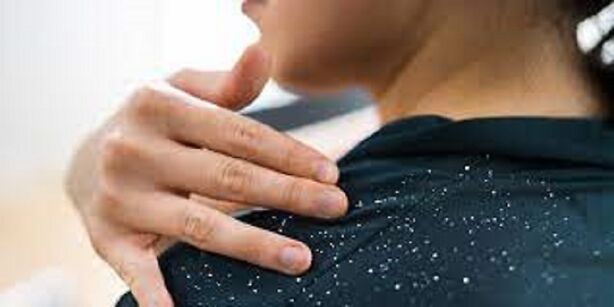Lifestyle
Simple Remedies for Monsoon-Induced Dandruff

Remedies for Monsoon-Induced Dandruff: The arrival of the monsoon heralds pleasure, joy, calm, and tranquillity. A break from the summer’s sweltering heat.
While the monsoon calms our senses, it also causes problems with the scalp and hair.
Increased atmospheric humidity wreaks havoc on the skin and hair on the scalp.
Dandruff and a dry, flaky scalp might result from this weather. Not to mention hair that is prone to breakage and frizz.
On the scalp, dandruff appears as little, white scales. Winter and monsoon seasons are often when it becomes worst.
The scalp serves as a biocenosis for various organisms, including Propionibacterium species, Malassezia species, and Staphylococci species.
READ MORE: Dry Cough Treatment in Ayurveda
A person with dandruff has 1.5–2 times the typical development of Malassezia, according to dermatologist Dr. Neha Sharma, founder of the Estique clinic in Gurugram.
Any form of excessive moisture on the scalp acts as a fungal haven. Using hair oils and gels, particularly during the monsoon, increases scalp moisture, resulting in dandruff. Malassezia fungus multiplies more quickly in the summer, but it also grows best during the monsoon season.
This is one of the leading causes of our scalp itching. According to Dr. Anup Dhir, senior consultant at Apollo Hospital and former president of the Indian Association of Aesthetic Plastic Surgeons, sebum, an oily material generated by the body’s sebaceous glands, tends to gather extremely readily on the scalp under humid circumstances.
The tendency of microbes to feed on this sebum to reproduce explains the higher risk of dandruff during the monsoon.
QUICK WAYS TO ELIMINATE DANDRUFF
Frequent washing is the most straightforward treatment for dandruff. In addition, reduce your use of hair oils and gels, particularly during the monsoon.
“Bhringraj and olive oil are the best hair oils for monsoon-related dryness if using hair oil. According to Ujjawal Ahuja, Director of Jovees Herbal, its high fatty acid content is the most excellent remedy for all of your dry scalp-related problems.
Use a shampoo with active anti-dandruff chemicals such zinc pyrithione, piroctone olamine, or ketoconazole to manage yeasts and fungi. You may use these shampoos two or three times each week.
“For those who like different hairstyles, switching to hair creams or hair sprays from hair gels is a smart move. Additionally, you may deep condition your hair once a week with a hair mask.
READ MORE: Yoga workshop for those who desire to live a healthier life.
As a result, it offers a shield that might lessen the chance that monsoon would harm your hair, according to Ms. Pooja Nagdev, founder of Inatur and an aromatherapist and cosmetologist.
Apply everyday home items to hair, such as apple cider vinegar, coconut oil, lemon, neem juice, fenugreek seeds, orange peel, green tea, and basil leaves. Keep hair dry. You can eliminate dandruff permanently with the aid of these natural treatments.
“Wash your gelled hair often if you use gel frequently. Additionally, don’t keep the gel on for more than a few days since it interferes with the sebum production, says Ahuja.


You must be logged in to post a comment Login